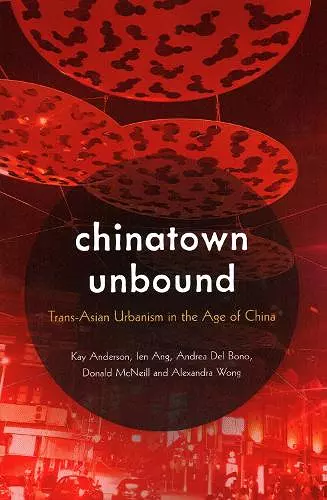Chinatown Unbound
Trans-Asian Urbanism in the Age of China
Ien Ang author Donald McNeill author Kay Anderson author Andrea Del Bono author Alexandra Wong author
Format:Paperback
Publisher:Rowman & Littlefield
Published:21st Oct '21
Should be back in stock very soon
This paperback is available in another edition too:
- Hardback£119.00(9781786608987)

‘Chinatowns’ are familiar places in almost all major cities in the world. In popular Western wisdom, the restaurants, pagodas, and red lanterns are intrinsically equated with a self-contained, immigrant Chinese district, an alien enclave of ‘the East’ in ‘the West’. By the 1980s, when these Western societies had largely given up their racially discriminatory immigration policies and opened up to Asian immigration, the dominant conception of Chinatown was no longer that of an abject ethnic ghetto: rather, Chinatown was now seen as a positive expression of multicultural heritage and difference.
By the early 21st century, however, these spatial and cultural constructions of Chinatown as an ‘other’ space – whether negative or positive – have been thoroughly destabilised by the impacts of accelerating globalisation and transnational migration. This book provides a timely and much-needed paradigm shift in this regard, through an in-depth case study of Sydney’s Chinatown. It speaks to the growing multilateral connections that link Australia and Asia (and especially China) together; not just economically, but also socially and culturally, as a consequence of increasing transnational flows of people, money, ideas and things. Further, the book elicits a particular sense of a place in Sydney’s Chinatown: that of an interconnected world in which Western and Asian realms inhabit each other, and in which the orientalist legacy is being reconfigured in new deployments and more complex delimitations. As such, Chinatown Unbound engages with, and contributes to making sense of, the epochal shift in the global balance of power towards Asia, especially China.
By portraying Sydney’s Chinatown as a communicative space in which people cross and challenge national boundaries to articulate their views and connect their voices, the book reminds readers that Chinatown is more a mental construct than an administrative or geographical reality. And by offering a sophisticated view of both new and evolving identities in Chinatown, it demolishes the idea of fixed boundaries that curtails potential epistemological avenues. Most importantly, it is a valuable corrective to the power imbalance between the West (Europe and North America) and the Rest (in this case, Asia), which has rendered Asianness and Chineseness a distant, fictive voice. . . both experts and lay readers can benefit from reading about a Chinatown that can be interpreted in many innovative ways and relish the challenges and opportunities of navigating its possibilities.
* Journal Of Chinese Overseas *Sydney's Chinatown has emerged from an ethnic enclave of internal exclusion to become a major hub mediating Australia-Asia relations. We learn in fascinating detail how state racialization of Chinese identity is giving way to a flexible deployment of all things Chinese in a transnational milieu of trade, culture, and politics. China Unbound explodes old models of Asian urbanism. -- Aihwa Ong, Professor of Socio-Cultural Anthropology and Southeast Asian Studies, University of California, Berkeley; author of Fungible Life: Experiment in the Asian City of Life
Instead of dwelling on the simplistic dichotomy between majority and minority, East and West, sameness and difference, and viewing Chinatowns as fixed and essentialized, authors in Chinatown Unbound have done an admirable job in unpacking the layers of tensions, complexity, and ongoing socioeconomic changes in Sydney’s Chinatown as a case study. The work is particularly relevant today with the rise of racial and ethnic tensions around the world and contestations over identities, migration, and belonging. -- Jeffrey Hou, Professor of Landscape Architecture, University of Washington, Seattle
As China races to become the world’s largest economy, the view of western Chinatowns as inward-looking ethnic enclaves, decimated by poverty and pervasive racism, has become anachronistic. In this superb interpretation of Sydney’s Chinatown, a team of top scholars of China overseas provide a sophisticated view of the identities of the new Chinatown, a view where diversity and transnational mobility provide the new normal, provoking substantial theoretical and empirical recalibration. -- David Ley, Professor, Department of Geography, University of British Columbia
Chinatown Unbound is a welcome and extremely timely refresh for this dynamic area of study. The book’s nuanced, incisive research presents us with a beautifully informed focus on the sociocultural contours of Sydney’s Chinatown. The sophisticated texture of this study will be relevant to many fields of research, from trans-Asian studies and cultural geography to Australian Studies, public culture, and migration and mobility studies. -- Tseen Khoo, Founding Convenor, Asian Australian Studies Research Network, La Trobe Univer
ISBN: 9781538147894
Dimensions: 229mm x 153mm x 19mm
Weight: 463g
256 pages